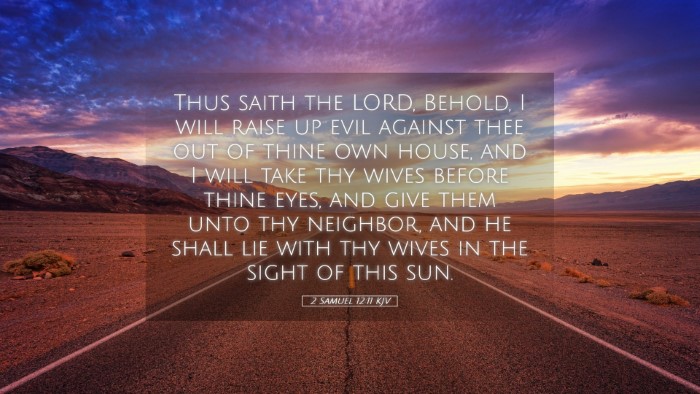Commentary on 2 Samuel 12:11
Verse Context: 2 Samuel 12:11 states, "Thus saith the Lord, Behold, I will raise up evil against thee out of thine own house, and I will take thy wives before thine eyes, and give them unto thy neighbour, and he shall lie with thy wives in the sight of this sun."
Introduction
This verse is a pivotal moment in the narrative of David’s life, representing the divine judgment for his sinful actions, particularly the adultery with Bathsheba and the murder of her husband, Uriah. The prophetic words delivered by Nathan the prophet provide deep insights that have been explored by biblical scholars and commentators.
Analysis of the Text
The Voice of God: The phrase "Thus saith the Lord" emphasizes the authority of God's message. It establishes that the impending judgment is not a mere warning but a direct command from the Divine.
Consequences of Sin: This verse outlines the principle of divine retribution. Matthew Henry points out that David’s sins will bear fruit in his own household, illustrating a common biblical theme where the consequences of one’s actions reverberate through one’s family and community. Clarke notes that this is not merely punitive—it serves as a sobering reminder of the severity and repercussions of sin.
Evil from Within: The phrase "I will raise up evil against thee out of thine own house" indicates that David's own family will become the source of his suffering. Barnes highlights that often those who have erred will find their greatest trials arise within their personal circles, further proving the adage that "A man's foes shall be they of his own household” (Matthew 10:36).
Spiritual and Moral Lessons
- Divine Justice: Adam Clarke emphasizes the biblical teaching that God is not blind to the injustices of humanity. This passage serves as a powerful reminder that divine justice may be delayed but is certain.
- Importance of Accountability: The narrative stresses the significance of accountability for one's actions. David’s rise and fall underscore the biblical principle that leadership carries heavy responsibilities that can lead to great consequences if mismanaged.
- The Role of Prophetic Voice: The interaction between Nathan and David highlights the critical role of prophets in calling the people back to righteousness. Their messages, often uncomfortable, are necessary for spiritual renewal.
- Public and Private Sin: This passage demonstrates that public and private offenses against God's commandments often have far-reaching effects. Henry notes that though David’s sin was initially secretive, the unfolding of its consequences would be public and humiliating.
Literary and Theological Significance
This verse is integral in understanding the theology of sin and judgment within the Old Testament framework. It not only serves as a record of divine speech but also as a narrative device that propels the story of David's life forward.
Impact on David's Kingship: The repercussions of David's sin will taint his legacy as a king. Barnes comments that while David is called a man after God’s own heart, this moment humanizes him, illustrating the complexity of human nature and divine expectation.
A Lesson for Leaders: This passage is a cautionary tale for leaders and individuals in positions of authority. The drastic consequences that David faced serve as a potent reminder that moral failure is not without significant repercussions.
Concluding Thoughts
The message encapsulated in 2 Samuel 12:11 goes beyond its immediate context into the realms of personal spiritual reflection for all believers. It raises profound questions about integrity, accountability, and the nature of God's justice.
As pastors, students, theologians, and scholars engage with this text, they are reminded that the gravity of sin, the assurances of God’s justice, and the hope for redemption are themes that resonate throughout scripture. This verse indeed challenges all to live righteously under God’s watchful eye, bearing in mind the reverberations of our actions in our communities and families.


